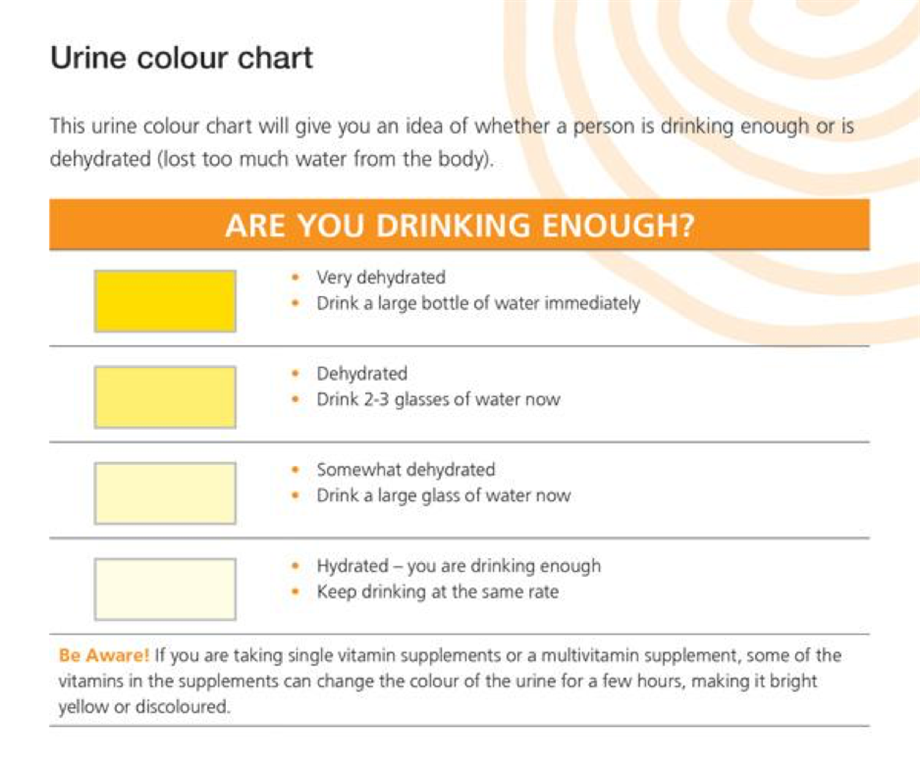Quick Links
Click on the links below to skip to that section:
Hydration
This information is adapted from: S Rancinais et al, ‘Consensus recommendations on training and competing in the heat’ published 11 June 2015.
Dehydration is fluid loss that occurs during exercise, mainly due to sweating and breathing. It makes athletes more susceptible to fatigue and muscle cramps. Not drinking enough fluid before, during and after exercise may lead to excessive dehydration, heat exhaustion and heat stroke.
Hydration Routine:
- Drink approximately 6mL per kilogram of body weight before training or matches in order to start exercise hydrated
- After exercise rehydrate adequately
- Eat food, or drink fluids, that are easily digestible and contain carbohydrate, protein and sodium (salt) to aid rehydration
- Low fat chocolate milk is recommended after training or matches as it contains protein, carbohydrate and sodium
How much fluid do I need?
- If 1kg of weight is lost during physical activity, drink 1L to 1.5L of fluid to rehydrate within one hour following training or matches
Points to consider:
- Dehydration may cause a decrease in performance
- Aim to drink enough to replace lost fluids, but not more
- Drinking too much fluid can lead to a dangerous condition known as hyponatraemia (low blood sodium)
- Sports drinks are not recommended as regular fluid replacements due to the potential for tooth decay
- Avoid alcoholic, hot or sugary drinks including tea and coffee (they can make dehydration worse)
- On hotter days drink a little more than usual
The following urine colour chart (sourced and adapted from NSW Health ‘Beat the Heat’ web page) provides a simple way for players to self-assess whether they need to hydrate (drink fluids).
Hydration and Dehydration
‘Hydrated’ means you are drinking enough and ‘dehydrated’ means your body has lost water and you need to drink fluids to make up for the loss.
ARE YOU DRINKING ENOUGH?

Soft Tissue Injury Management
This information is adapted from Sports Medicine Australia (SMA) resources.
The best way to recover from soft tissue injury is by using the RICER and NO HARM injury management approach.
R = REST. Place yourself in a comfortable position and keep the injured area supported. Avoid using the injured area for at least 48-72 hours because continued activity may cause bleeding and damage.
I = ICE. Apply ice to the injured area for 20 minutes every 2 hours for the first 48-72 hours after injury. Do not apply ice directly to skin.
C = COMPRESSION. Apply a firm, wide, elastic bandage over, above and below the injured area. Ensure the bandage is not too tight.
E = ELEVATION. Raise the injured area above the level of the heart at all times to reduce bleeding, swelling and pain.
R = REFERRAL. As soon as possible after injury arrange to see a qualified health care professional.
NO HARM = NO HEAT, NO ALCOHOL, NO RUNNING, NO MASSAGE.
Nutrition and Recovery
This information is adapted from Fact Sheets published by The Australian Institute of Sports.
Athletes require a high carbohydrate intake on a daily basis to replenish muscle stores after each training session. This means making carbohydrate foods such as bread, breakfast cereal, fruit, pasta, rice, vegetables, low fat milk and yoghurt the focus of meals and snacks.
Before exercise eat a light carbohydrate snack to keep fuelled during exercise. Players who fail to consume sufficient carbohydrate may suffer mid-week slumps and progressive fatigue over the season.
Match Preparation: An easily digested high carbohydrate meal should be eaten 2 - 4 hours before a match. Breakfast cereal with fruit, pasta with a tomato-based sauce, bread rolls or sandwiches, baked potatoes with low fat fillings and fruit salad with yoghurt are all good options.
Within 30 minutes of finishing training or matches players should aim to have 50 - 100 grams of carbohydrate and some protein.
Recovery snacks should be combined with fluid to replace any fluid lost during the session. Nutritious carbohydrate/protein recovery snacks include:
- 300 - 600ml low fat flavoured milk
- 250 - 300ml milk shake or fruit smoothie
- 250 - 300ml liquid meal supplement
- 1 sports bar (check labels for carbohydrate and protein content)
- 1 cereal bar + 200g carton fruit-flavoured yoghurt
- 1 bread roll with cheese/meat filling + large banana
- 220g baked beans on 2 slices of toast
- 300g (bowl) fruit salad with 200g fruit-flavoured yoghurt
- 2 crumpets with thick spread peanut butter + 250ml glass of milk
- 300g creamed rice
- 1 large bowl (2 cups) breakfast cereal with milk
- 300g (large) baked potato + cottage cheese filling + glass of milk
Post-Match Recovery Strategy
This information is adapted from the Australian Sports Commission, Sports Coach resources.
Basic recovery practices that can be completed by a team participating at any level are listed below.
This routine has been structured so that the body can be rehydrated, energy stores can be replenished and muscle can be repaired at an improved rate.
1. Take a short walk or jog and complete a static stretch routine after training or a game day.
2. Start drinking cool carbohydrate and protein drinks (e.g. low fat chocolate milk) immediately on entering the change rooms. This should continue throughout the recovery session.
3. Players should bring food to eat within 30 minutes after the game/exercise. Appropriate types of food include carbohydrate and protein snacks e.g. sports bars, salad and meat sandwiches.
4. Some players have difficulty eating soon after physical exertion; therefore a meal replacement drink (e.g. Sustagen or Protein Plus) may be useful.
5. A post game meal (two to three hours post-match) should consist of high glycaemic index carbohydrates. Good examples of these dishes are rice dishes, pasta and/or white bread with protein (e.g. meat, chicken).
6. Ensure a good night’s sleep occurs after training or matches to aid rest and recovery